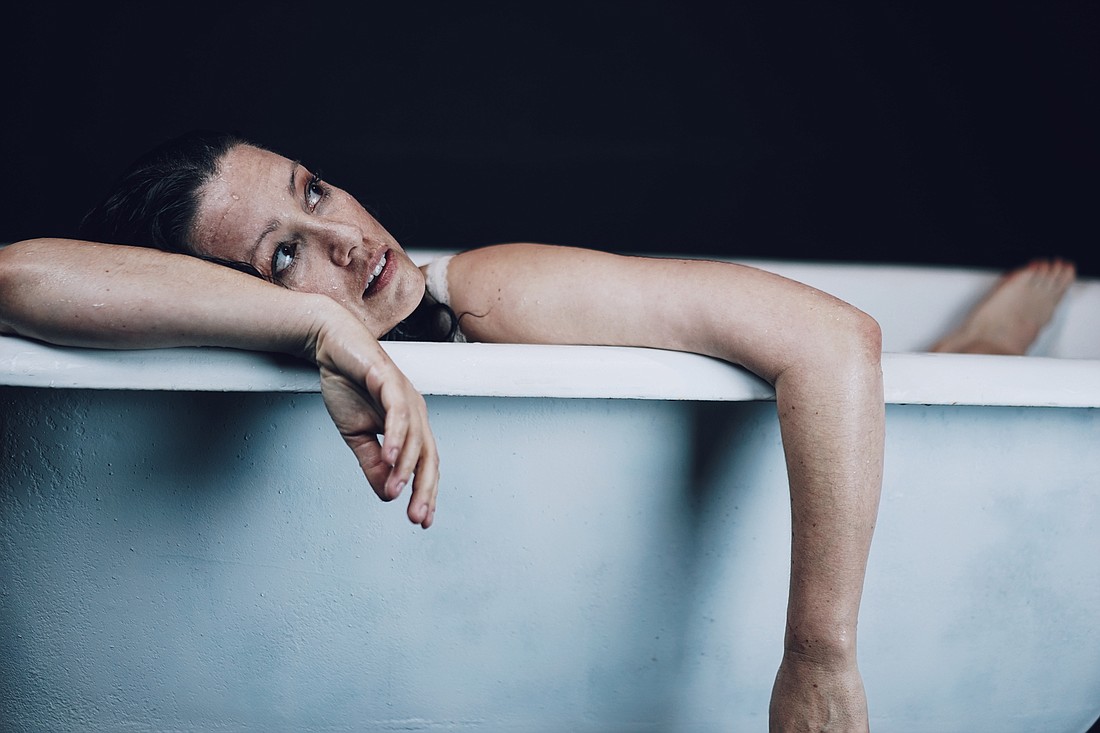- May 4, 2024
-
-
Loading

Loading

A black box theater is a no-frills performance space, where experimental theater bounces off the walls. The Urbanite Theatre has the black-box concept in its DNA. The interior, in fact, is painted black. Currently, three white bathtubs punctuate the bare stage. Three actresses emerge, speaking in turn.
"She was found under the floorboards."
"She was found with her throat cut."
"Found in a suitcase."
The words pour out in a flood. Director Brendan Ragan sits at the edge of the stage, taking it all in. The performers are Katherine Michelle Tanner, Nicole Jeannine Smith and Carley Cornelius. They’re all here for the initial rehearsal for “The Drowning Girls.”
"Going under. Submerging. Darkness."
Ragan absorbs these words with undivided attention. He’s the co-artistic director of the Urbanite Theatre. Although he’s directed in theaters around the country, “The Drowning Girls” will be the first play he’s helmed at his own theater. And it’s not easy material.
Beth Graham, Charlie Tomlinson and Daniela Vlaskalic’s play re-imagines the infamous “Brides in the Bath Murders” of 1912-14. A real-life rotter named George Joseph Smith had a simple get-rich-quick scheme. He’d convince a trusting woman to marry him, hand over her life savings and take out a life insurance policy naming him the sole beneficiary. He’d casually mention his wife’s dizziness and fainting spells to the neighbors. Then he’d drown his bride in the bathtub and collect the money.
But the young women on stage seem to have nothing to fear. After humming “Tea for Two,” they begin a tea party. Each is giddy to tell the tale of how they met a new man.
Ragan shapes the scene. He starts with physical movement — the timing of when to put the teapot down. A few tries. And the actress finds the right moment where it punctuates and doesn’t interrupt the dialog. He’s on his feet now, shaping the sense of character behind the words.
"There was a man standing across from me as we sang. Baritone."
"He kept looking at me. Staring."
"How daring."
"How rude."
Ragan takes them back to the scene’s beginning. Three young women, each bursting with news. He singles one of them out.
“Okay, when your passage ends, stop like you’ve been cut off," he says. "You’re anxious to tell your story, but someone talks over you. Without the interruptions, you’d keep talking and talking. You’re burning to tell your story, but you can’t. That’s what’s funny about the scene.”
She plays it that way — and it plays better.
The women glide in and out of the tubs, only miming getting wet during rehearsal. Ragan’s few words have a powerful effect. Gradually, the shapeless mass of words finds a skeleton of action. The words become expressions of character, and the play takes shape. It's only a shadow of its final form, but even the shadow is disturbing. The crossroads of heartlessness and the innocence of young women taught to put their life in a man’s hands, and inadvertently taught to be the perfect victims for George Joseph Smith.
Rehearsal ends, and the three actors emerge from the spell that turned them into other people. They laugh and smile — alive with the energy of a team that’s won the big game. “The Drowning Girls” is a powerful stuff, and they know it.
Actors’ Insights
Nicole Jeannine Smith: "It’s kind of like 'Metamorphosis,' but terrifying. Carley and I are roomies for the duration of the play. Yesterday, after I took a shower, I said, 'I’m never going to look at a bathtub the same way again.'"
Katherine Michelle Tanner: "The first read is always fun. We’re discovering our characters and the way we play off each other. It’s never predictable, especially when you’re really playing multiple roles."
Smith: "I’m playing, I think, 10 people, along with the doomed bride. Each character has his or her own speech pattern and attitude, and you’re constantly switching back and forth."
Carley Cornelius: "That structure really brings out the athleticism of your acting. Right now, we’re slowly finding who our characters are. Sometimes, how they move tells you how they think. You’re slowly discovering who this person is."
Director’s Directives
Ragan takes a low-key, Taoist approach — the antithesis of the dictatorial director. But his gentle suggestions work. I wanted to know how he did it. But I was curious about something else.
Why’d you wait so long before directing at the Urbanite?
"We didn’t want to spread ourselves too thin. Summer Dawn Wallace is my co-artistic director. Both of us decided to put directing on hold through all the pressures and details of founding a new company. We gave ourselves time to get it right."
Why’d you select this play?
"The story is 100 year old, but Summer and I felt it has a quite a bit of resonance with women’s issues today. These women’s lives revolved around George Joseph Smith. They had a lot at stake in a husband: their place in society, their status in their family, their financial standing. All these revolved around a man, and that put them at the mercy of this man. We’d like to think that’s changed, but many women today have the same vulnerability."
The actors speak in contemporary American speech patterns, not Edwardian British English. Why?
"Because it’s distancing. We didn’t want to make this seem like a period piece or a problem exclusive to England. That’s the same reason Anna Jordan Smith adapted her plays to an American setting for us. With a contemporary approach, the audience sees a reflection of itself. These aren’t 'other' people in a remote time and place."
How does it feel being in the director’s chair at the Urbanite?
It feels great. I’m excited to be backstage, getting my hands dirty. Summer will be directing before too long, as well.